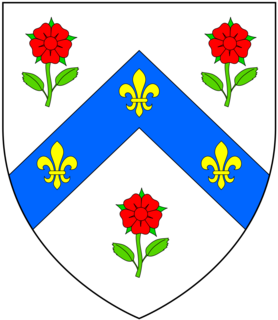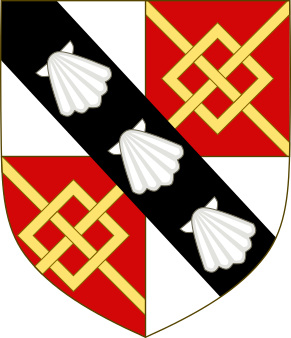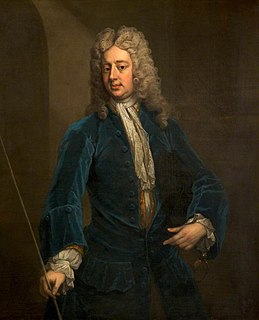
Edward Montagu, 2nd Earl of Manchester, KG, KB, FRS was an important commander of Parliamentary forces in the First English Civil War, and for a time Oliver Cromwell's superior.

Sir Henry Neville was an English courtier, politician and diplomat, noted for his role as ambassador to France and his unsuccessful attempts to negotiate between James I of England and the Houses of Parliament. In 2005, Neville was put forward as a candidate for the authorship of Shakespeare's works.

Yarnton is a village and civil parish in Oxfordshire about 1 mile (1.6 km) southwest of Kidlington and 4 miles (6 km) northwest of Oxford. The 2011 Census recorded the parish's population as 2,545.

Sir John St John, 1st Baronet of Lydiard Tregoze in the English county of Wiltshire, was a Member of Parliament and prominent Royalist during the English Civil War. He was created a baronet on 22 May 1611.
Sir John Walter was an English judge and Member of Parliament.

There have been three baronetcies, all in the Baronetage of England, created for members of the Spencer family, both for descendants of two younger sons of Sir John Spencer (1524–1586) of Althorp, Northamptonshire:
Sir Thomas Penyston, 1st Baronet (1591–1644) was a 17th-century member of the gentry who received one of the first baronetcies. In 1637 he was sheriff of Oxfordshire and in 1640, he was a member of parliament for Westbury.

Sir Walter Cope of Cope Castle in the parish of Kensington, Middlesex, England, was Master of the Court of Wards, Chamberlain of the Exchequer, public Registrar-General of Commerce and a Member of Parliament for Westminster.
Sir Richard Molyneux, 1st Baronet (1560–1622) was a Member of Parliament for Lancashire, Mayor of Liverpool and Receiver-General of the Duchy of Lancaster.

Sir Edward Seymour, 2nd Baronet was an English landowner and politician who sat in the House of Commons between 1601 and 1625. He was an ambassador to Denmark. During the English Civil War, he supported the Royalist cause.

Sir Anthony Cope, 1st Baronet of Hanwell in Oxfordshire, was an English Puritan Member of Parliament.

Sir Thomas Spencer, 3rd Baronet was an English politician who sat in the House of Commons from 1660 to 1679.
Sir Edward Smith, 1st Baronet was an English landowner and politician who sat in the House of Commons in 1653.
Sir Edward Peyton, 2nd Baronet was an English landowner and politician who sat in the House of Commons at various times between 1621 and 1629. He fought for the Parliamentary cause in the English Civil War.
Sir Richard Worsley, 1st Baronet was an English landowner and politician who sat in the House of Commons between 1614 and 1621.
Sir Richard Musgrave, 1st Baronet was an English politician who sat in the House of Commons from 1604 to 1611.
Sir William Walter, 1st Baronet was an English lawyer and politician who sat in the House of Commons from 1628 to 1629.

Sir John Spencer was an English nobleman, politician, knight, sheriff, landowner, and Member of Parliament. He was an early member of the Spencer family.

Sir John Stonhouse, 3rd Baronet, PC (c.1672–1733) was an English landowner and Tory politician who sat in the English and then British House of Commons from 1701 to 1733.

Thomas Savage, 1st Viscount Savage, 2nd Baronet, was an English peer and courtier in the reign of Charles I.











